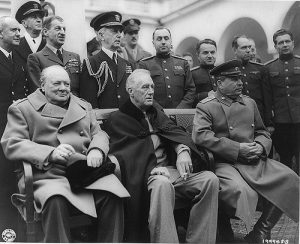Since the Iron Curtain fell, numerous Central and Eastern European nations have enjoyed freedom and independence impossible under Soviet rule. Poland is among the most successful of these countries, compensating for the inefficiencies of its old centrally-planned economy, and recently achieving market classification as a developed nation. Even with this newfound prosperity, the current Polish government, led by Prime Minister Mateusz Morawiecki, has not forgotten the country’s economic difficulties following the Second World War.
After 1945, Poland struggled to repair damages stemming from the war costing between one and five trillion dollars. Some argue that the remaining vestiges of the communist system should also be considered part of these war damages, and evaluated as such. While the communist government installed by the Soviet Union allegedly renounced war reparations, current Polish officials are discussing the legal and political possibility of officially demanding war reparations from Germany. While their rhetoric may seem aggressive and out of date, the issue reaches beyond simple political pragmatism to one of historical justice.
Damages of the Second World War
The secret Ribbentrop-Molotov pact between Nazi Germany and the Soviet Union led to the joint invasion of Poland in 1939. This occupation resulted in countless crimes, including genocide, the elimination of Polish societal elites, religious persecution, coerced labor, the mass displacement of people, the theft of national cultural treasures, and numerous other atrocities. Overall, about 6 million citizens of Poland, disproportionately of the Jewish faith, died, many of them in Auschwitz-Birkenau or one of the other twelve thousand concentration camps Nazi Germans established in occupied territories. Furthermore, numerous villages, towns, and cities were left in ruins.
After Nazi Germany surrendered in 1945, the Yalta conference resulted in the USSR’s occupation of Poland and the establishment of a new, communist government. While Western European countries received financial aid from the United States through the Marshall Plan, the Soviet Union prevented its satellite states from receiving Western help, and Poland was tasked with rebuilding its economy via an inefficient centrally-planned system.

Winston Churchill, Franklin Roosevelt, and Joseph Stalin at the Yalta conference, 1945.
At this time, the Allies forced both East and West Germany to pay reparations to some countries, including Poland. However, as Arkadiusz Mularczyk, a member of Polish Parliament from the Law and Justice party, told the HPR, “Polish losses were the largest, [but] Poland has received no war reparations that correspond to the scale of the damage sustained during the war.” He explained that the USSR never realized its Potsdam agreement obligation to transfer reparations to Poland, and instead forced Poland to “deliver millions of tons of coal at low prices” to its oppressor. “The Poles, despite being victors of the war, were left behind by the Great Powers,” he added. These injustices of the past are now starting to be recognized by today’s Law and Justice party.
Poland Today
During the Law and Justice party’s convention in July 2017, party leader Jarosław Kaczyński raised the concern that the tremendous damage caused by Nazi Germany had never been compensated. Soon thereafter, Mularczyk appeared in the headlines of Polish newspapers when he asked the parliamentary Bureau of Research to weigh in on the legal possibility of demanding further reparations from Germany. In his interview with the HPR, Mularczyk pointed to “the courage to stand on the international stage in defense of the Polish people and Polish interests” as the reason his party came back to the reparations issue. He believed that “these interests, as opposed to the ad hoc alliances among European states, are eternal,” and therefore the party is ready to stand up and protect them.
Since then, the Polish media has become awash with discussion of war reparations. The topic is not new to the public, as it has recurred several times over the last three decades of the Third Polish Republic. Nevertheless, this time the issue has the potential to unfold in a new direction, as the Law and Justice leadership has been more resolute in its approach than previous administrations.
Reparations on the Table
In response to Mularczyk’s inquiry, Poland’s parliamentary Bureau of Research has stated that demanding war reparations from Germany is indeed legitimate. Professor Bogdan Musiał, a Polish-German historian of World War Two, also finds the cause reasonable. He told to the HPR that Polish officials could claim reparations by a “centrally coordinated action,” involving “both a legal and a political way as well as discussion at an international forum.”
Major Polish politicians have presented a similar standpoint. In an interview with Gazeta Polska, Kaczyński discussed possible political strategies to translate the ongoing debate to real political action. Regardless of the outcome, he perceives the action as a chance to publicize the Polish perspective on the reality and consequences of the Second World War. Former Polish Prime Minister Beata Szydło said that it would be demanding justice to push Germany to take responsibility. “We are a victim of World War Two and the damage has not been reimbursed in any way—just the opposite,” Szydło stated.
In response, Germany has vigorously opposed these claims, citing the Treaty on the Final Settlement with Respect to Germany of 1990, previously paid reparations to Poland, and Poland’s waiving of the right to further reparations. Mularczyk, however, refuted the above-mentioned points and expressed the view that Germany has yet to advance an anti-reparations argument that poses a genuine obstacle to Poland’s reparations claim. He also stated that the German government’s official narration had been inconsistent over the years. Professor Musiał suggested that German officials have been “aware that their country has owed Poland reparations,” but have not been willing to pay them.
One potential argument Germany could use to rebuff Poland is its postwar loss of territory: after World War Two, Poland broadened its Western borders at Germany’s expense. However, moving Poland’s borders to the West was Stalin’s idea, construed so that the Soviet Union could capture a much greater territory in Eastern Poland. The idea was approved by Churchill and Roosevelt during the conference in Tehran, but condemned by the Polish government-in-exile.
In addition, the argument does not seem powerful in the context of the scale of damage done by Poland’s wartime aggressors. Mularczyk cited the loss of 39 percent of Poland’s material potential and 48 percent of its prewar territory as exemplary of these damages. Furthermore, Polish archives suggest that, when adjusted for inflation, the benefits from the expansion into German territory yielded $40 billion, compared to about $1 trillion of loss caused by Germany in the war. Economic considerations aside, Mularczyk underlined that the aggressors “committed a hecatomb on the people.” Professor Musiał agreed that the scale of damage makes the Polish case “extraordinary.”
German-Polish Relations
Historically, postwar relations between Poland and Germany have been complicated. This was initially because of Germany’s burden of the Nazi era, and later, due to the division of Germany and Moscow’s control of Polish foreign policy. Despite these difficulties, German-Polish relations have been relatively peaceful and stable since 1945. The reconciliation was epitomized when Polish bishops “forgave and asked for forgiveness” soon after the war, and the partnership of these two members of European Union has been strong in recent years, especially in trade deals.
For the Law and Justice party, however, strong relations with Germany must come second to historical justice. As Mularczyk put it, “a good relationship with our neighbors can only be built on a foundation of truth.” He added that “the principles of righteousness resulting from morality and the norms of international law are markedly more important than maintaining seemingly strong Polish-German relations based on slogans of reconciliation.” In his opinion, the previous governments’ failure to ask for reparations resulted in “the lack of redress for the victims of war crimes and the lack of compensation for crimes against humanity.” Furthermore, Mularczyk is concerned by the present-day implications of the lack of compensation, namely “the significant lag behind Western Europe, from which Poland suffers unto this day.”
What comes next?
Professor Musiał commented that it was “the German government’s pressure” that prevented previous Polish administrations from claiming the reparations. Polish politics, however, have profoundly shifted since the Law and Justice party came to power in 2015. The party’s opponents perceive the new focus on reparations as a threat to the country’s diplomatic relations with Germany and the European Union, viewing it as a sort of adventurism. The supporters of Law and Justice, on the other hand, believe that the new approach demonstrates patriotism and loyalty towards Poland, and serves as a harbinger of a new, revitalized Poland.
For Law and Justice, the reparations issue is a matter of morality that transcends current politics. Demanding that Germany pay reparations to Poland is a powerful promise around which Law and Justice can stake its legacy and satisfy those supporters who care about the country’s difficult history. Hopefully, Poland and Germany will finally resolve the matter with mutual respect, in a manner yielding both solidarity and justice.
Image Credit: Wikimedia Commons/M. Swierczynski // Flickr/Pingnews.com // Flikr/Piotr Drabik
